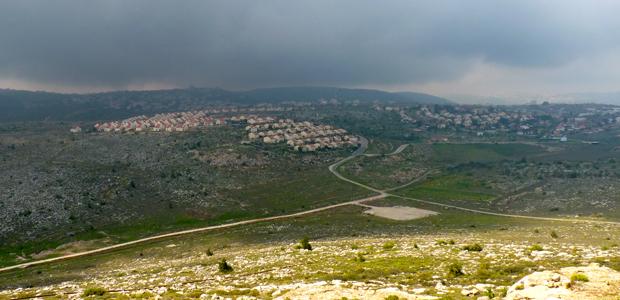Future of Israel’s Amona Settlement Outpost Uncertain
The Amona outpost sits on a hill overlooking the much larger Jewish settlement of Ofra. (Photo: Matthew Bell)
Israel’s Supreme Court made a surprise decision this week. In a unanimous verdict, the judges shot down a government proposal to postpone the evacuation of Migron, a 10-year-old Jewish settlement outside the Palestinian city of Ramallah.
The decision could set a precedent for other illegal settlement outposts in the Israeli-occupied West Bank. One of them is called Amona.
Community spokesman, Avner Goldschmidt gave a small group of journalists a tour of the rocky hilltop outpost. Somehow, he managed to keep his yarmulka from being snatched away by the wind, by repeatedly grabbing it off his buzz cut head, just in the nick of time.
Amona is one of the largest of about a hundred settlement outposts. Some 200 people live here. The international community considers all of the Jewish settlements in the West Bank and East Jerusalem — home to more than half a million Israelis — to be illegal. But under Israeli law, there is a difference between the settlements and the outposts.
The outposts were established illegally, without government authorization. But despite a string of lawsuits, court rulings, and promises by the Israeli government to the contrary, the outposts have endured since the mid-1990s.
Like other Israeli settlers, Goldschmidt does not use the term “West Bank.” He grew up in what he calls Samaria, the Biblical name for the northern West Bank. Another word he avoids using is “outpost.”
“Amona is a Jewish community,” he said, “founded in 1996. People here raise sheep, grow grapes and make wine.”
“One day, I hope Amona will be a more developed area just like the much larger Israeli settlement of Ofra,” he said, pointing to the settlement just down the hill from Amona.
But at Goldschmidt’s feet, there was a reminder of how that dream could be deferred. He stood on a heap of broken tiles and construction debris that used to be a house.
In 2006, around 7,000 Israeli security forces were deployed to demolish nine newly built homes in Amona. Goldschmidt was in the crowd that clashed with police that day. No one was killed, but it was a violent scene with serious injuries that shocked many Israelis. Goldschmidt says he’s confident who will win in the long run.
“These homes will be rebuilt, with the help of God,” he said. “Look at all the other thriving settlements in this area.”
But there is a deadline looming over Amona. The Israeli government has committed to evacuating the outpost by December 31st.
Several other outposts face deadlines as well. A few miles down the road from Amona is Migron, which more than 300 Israelis call home. After weeks of negotiations, Israeli lawmakers signed a deal with the residents of Migron to get them to relocate before a March 30th deadline for evacuation. The government would help build new homes for the residents on a nearby hilltop, if they agreed to move there by 2015.
But the Supreme Court this week said no. The judges dismissed the arrangement as a stalling tactic. They set a new evacuation deadline for August 1st.
There are fears that any forced evictions of settlement outposts could turn violent. But Revital Halbersted, sitting in the living room of her home in Amona, with her 9-month-old daughter on her lap, says she and her husband are realistic.
“We built here our house and we built here a lovely community,” she said. “It’s very, very hard to leave here and to move everything.”
“But if will need to be more flexible,” Halbersted admitted. “We will do it.”
“I don’t want a fight at all,” she said.
Halbersted pointed out that this is precisely why the family built a home without a permanent foundation. If necessary, the house can be moved somewhere else. And if things get really bad, she said the couple still owns a place at another more established settlement nearby.
Former state prosecutor Talia Sasson is an expert on the settlement outposts. In 2005, she was appointed by then-Prime Minister Ariel Sharon to write a report on the outposts. In an interview at her home outside Jerusalem, Sasson said this is really a straightforward legal issue.
“The outposts are illegal,” she says. “So, follow the law. The government of Israel should follow the law. And they don’t.”
Right-wing lawmakers who support Jewish settlements in the West Bank are threatening to retroactively legalize all the outposts through new legislation. This would settle the issue once and for all, they argue. It would also prevent any future violence between security forces and settler. But Sasson said such a law would be unconstitutional and she doubts it will come to pass.
For Sasson, the issue comes down to the importance of the rule of law. If the Supreme Court says the outposts of Amona and Migron were built illegally on Palestinian lands, Sasson says, the government needs to follow the court’s orders to evacuate them.
We want to hear your feedback so we can keep improving our website, theworld.org. Please fill out this quick survey and let us know your thoughts (your answers will be anonymous). Thanks for your time!
